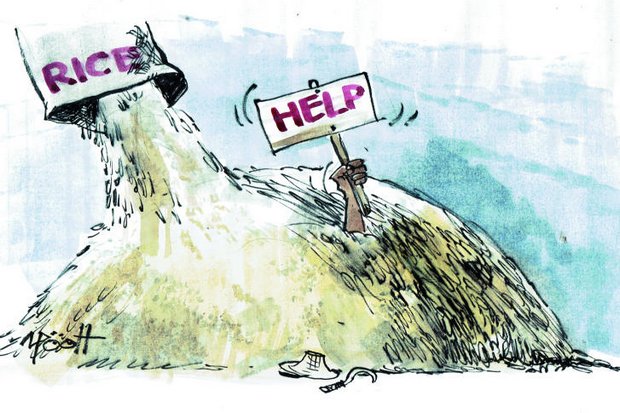
It has become a common scene during the annual harvest season for rice farmers nationwide to call for state subsidies to shore up the falling prices of their produce.
This is the first time that prices have plunged to around 5,000 to 6,000 baht per tonne for unmilled rice -- the lowest in decades.
Despair among farmers has prompted those from other sectors of society, including academics and entrepreneurs, to look for ways to ease their plight.
The willingness to help is palpable. Celebrities have taken to social media to promote Thai rice produced by local farmers.

Sirinya Wattanasukchai is an assistant news editor, the Bangkok Post.
Those with designing skills have offered their services for free to create more attractive packaging for Thai rice -- a good, but short-term solution.
State officials blame the fall in domestic rice prices on global pressures, which have driven down international prices and seen millers offer low prices for newly harvested rice.
Some academics say the problem has been compounded by an oversupply of rice caused by the unpredictable weather which has squeezed more harvests than normal into this year.
Despite the playing out of market forces to the detriment of our farmers, it's a curious thing that prices of packaged rice sold in supermarkets are as stable as ever.
I won't go into detail of the various kinds of subsidies of different governments because they are all short-term solutions; be it the rice-pledging scheme during Yingluck's government or the latest so-called rice barn pledging programme.
It's well known that rice is a political commodity used to win votes in elections, rather than being seen as the lifeline of millions of Thais.
One approach the government could adopt is to stop blaming the rice price issue on international forces, and create a mechanism whereby farmers do not have to rely on the price set by middlemen.
It's welcome news that, in addition to the Agriculture Ministry's soft loan totalling over 2 billion baht to affected farmers, the Commerce Ministry has appointed provincial commerce offices to help local rice farmers sell rice by themselves.
A number of private millers have agreed to offer services that they are not normally in the habit of doing, such as drying, storing and milling, for farmers.
I am impressed with Prime Minister Prayut Chan-o-cha's quick response in encouraging to farmers to engage in online direct sales and leave out the middlemen.
His supportive comments have not only silenced some officials who questioned whether online selling is against the law but also provided moral support to farmers.
Also, I appreciate how quick soldiers were in going out to paddle fields to help farmers with the harvest -- which will help farmers cut production costs.
This showed that Thai soldiers are not only versatile and practical, but also compassionate enough to lend a hand to people in a crisis.
But I also hope that the military government, and the next administration to come to power, will not rely on short-term, knee-jerk solutions. What is needed is a preventative, or long-term plan.
The state should stop encouraging farmers to produce rice in a robotic fashion, whereby they are fixated on maximising product yield to maintain the country's ranking as the top rice exporter.
The state should instead start educating itself and farmers on how to add more value to rice by turning the simple jasmine rice grains into other products with higher market value.
Or at least, the state should encourage farmers to learn how to sell their product without relying on middlemen. Online direct sales, which appear to be a success so far, are just the beginning.
The state should look for ways to build on this success, drawing in as many as farmers and providing them with internet access.
If Gen Prayut endorses the idea of direct sales by the farmers, he must issue commands to those at the operational level to work on it (and also ask his deputy not to make cynical comments, such as "let them sell fertiliser", when reporters mentioned that fertiliser has become more expensive than rice).
Trading no longer needs to remain conventional with the advent of social media and the internet. If Gen Prayut wishes to see the country move into the digital age, this is the time to see that happen: Equip farmers with the knowledge and tools to allow them to fend for themselves.
